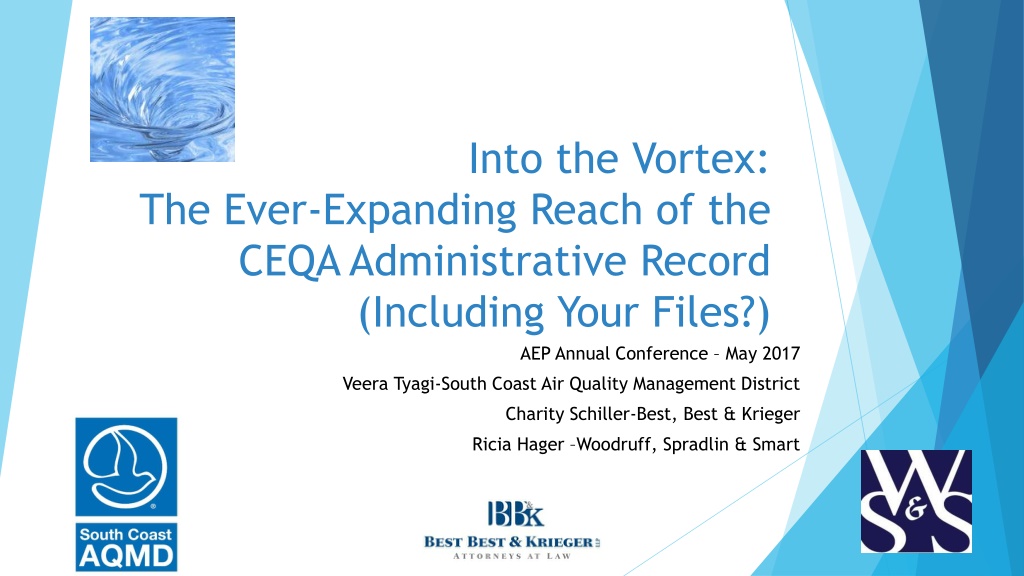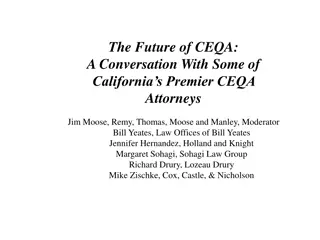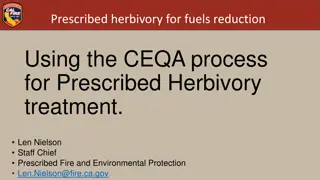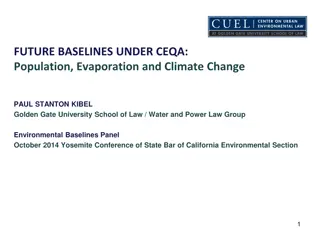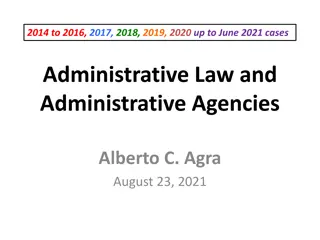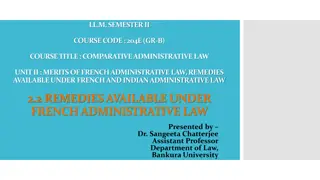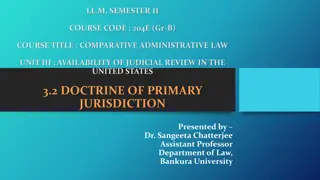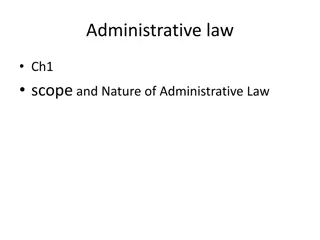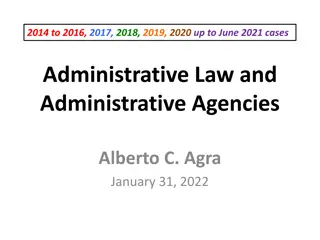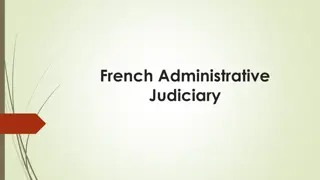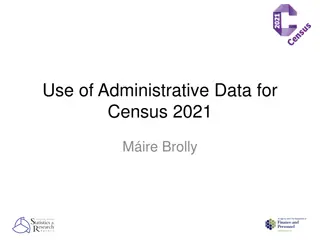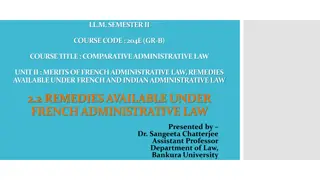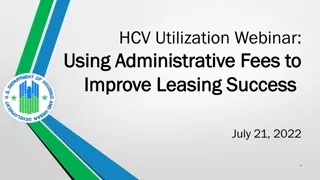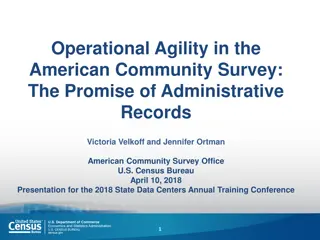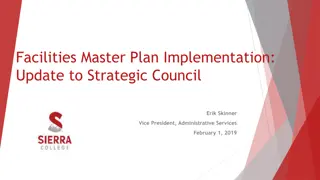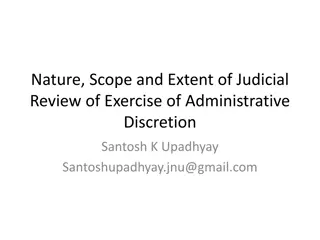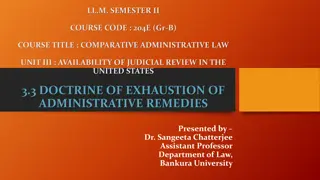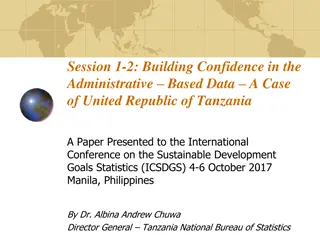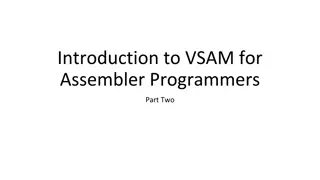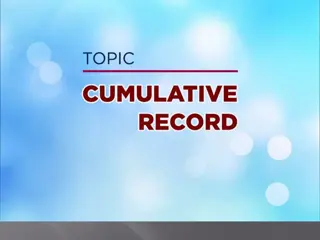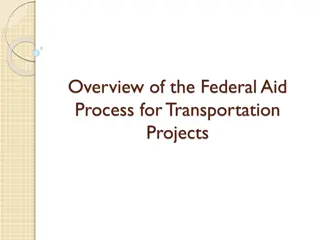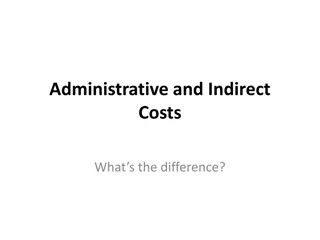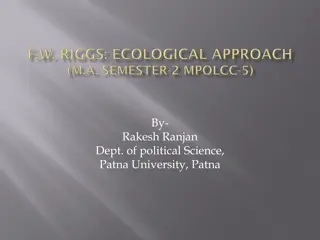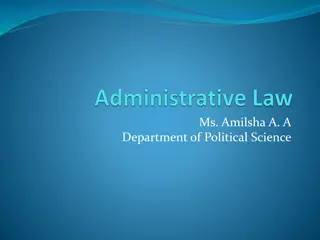Understanding the CEQA Administrative Record
Exploring the Ever-Expanding Reach of the CEQA Administrative Record, key issues addressed, importance of document organization for CEQA compliance, and the impact of caselaw on project approvals.
Download Presentation

Please find below an Image/Link to download the presentation.
The content on the website is provided AS IS for your information and personal use only. It may not be sold, licensed, or shared on other websites without obtaining consent from the author. Download presentation by click this link. If you encounter any issues during the download, it is possible that the publisher has removed the file from their server.
E N D
Presentation Transcript
Into the Vortex: The Ever-Expanding Reach of the CEQA Administrative Record (Including Your Files?) AEP Annual Conference May 2017 Veera Tyagi-South Coast Air Quality Management District Charity Schiller-Best, Best & Krieger Ricia Hager Woodruff, Spradlin & Smart
Veera Tyagi South Coast Air Quality Management District Principal Deputy District Counsel 21865 Copley Drive Diamond Bar, CA 91765 Phone: (909) 396-2306 Email: vtyagi@aqmd.gov
Charity Schiller Best, Best & Krieger Partner Riverside Office Phone: (951) 826-8223 Email: charity.schiller@bbklaw.com
Ricia Hager Woodruff, Spradlin & Smart Partner Costa Mesa Office Phone: (714) 415-1024 Email: rhager@wss-law.com
Introduction: Issues To Be Addressed The CEQA Administrative Record - Refresher Whose Documents Can Be Reached? Which Documents Can Be Reached? Which Documents Should Be Reached? (Got Substantial Evidence?) Best Practices!
The CEQA Administrative Record A Quick Review!
CEQA Cases are Tried on an Administrative Record Typically CEQA cases do not involve discovery or witnesses Like a math problem, the administrative record shows the work for CEQA compliance purposes The administrative record can make or break a case! Requires careful consideration
Caselaw: Protect Our Water v. County of Merced (2003) 110 Cal.App.4th 362 (and progeny) Majority of relevant documents were neither properly indexed nor coherently organized. Nearly impossible to locate the pertinent documents [U]nclear whether we have complete copies of the pertinent documents.
Caselaw: Protect Our Water v. County of Merced Cotd. The consequences of providing a record to the courts that does not evidence the agency s compliance with CEQA is severe reversal of project approval.
Who Prepares the Administrative Record? Pub. Res. Code 21167.6(a), (b)(2) Public Agency generally But, CEQA allows the Petitioner (challenger) to elect to prepare When the Petitioner elects to prepare, the Petitioner usually submits a Public Records Act request to the lead public agency for all of the documents related to the CEQA document and the Project
What Should Be in the Record? (Pub. Res. Code 21167.6) All applications All staff reports All written evidence submitted to or from the public agency regarding CEQA All public agency notices All written comments on the environmental documents Transcripts or minutes of agency hearings where CEQA was considered
What Should Be in the Record? (Contd.) All written testimony or documents relevant to the CEQA findings The final environmental documents Proposed decisions or findings submitted to the decisionmaker All documents relied on in the findings The full record from the inferior body if the decision is appealed Any other materials relevant to the agency s compliance with CEQA
Into the Vortex Whose Documents Can Be Reached?
Current Trends Petitioners are looking beyond the public agency s own files Seeking to reach the files of third party consultants The Public Records Act is the tool of choice Though, public records are not necessarily CEQA record documents Discovery is another tool that is now being used more often to obtain documents
Caselaw: Consolidated Irrigation District (and progeny) 205 Cal.App.4th 697 Were third party documents within the files of the public agency? Critical factors: (1) Contractual privity (there was a contract between the public agency and the consultant) (2) Language of the contract (per the contract, the consultant s work belonged to the public agency)
Consolidated Irrigation District (Cotd.) The subconsultant s files in this case could not be reached because the subconsultant s contract was with the primary consultant and not with the public agency (no contractual privity)
Caselaw: Friends of La Vina v. County of Los Angeles (1991) 232 Cal.App.3d 1446 (and progeny) Sometimes the developer (not a public agency subject to the PRA) will prepare a draft CEQA document and provide to the public agency for review. The [cases on EIR preparation] consistently confirm that the preparation requirements of CEQA . . . and the [State CEQA] Guidelines turn not on some artificial litmus test of who wrote the words, but rather upon whether the agency sufficiently exercised independent judgment over the environmental analysis and exposition that constitute the EIR.
BEST PRACTICES Before entering into contracts (from either the public agency perspective or a private party), consider who will be contracting with who? Carefully consider the language of the contract and its consequences
Which Documents Can be Reached? Email- Pros & Cons
PROS! Easy way to exchange thoughts Very convenient Rapid information exchange Teams can form across large geographic areas
CONS! Humor / Sarcasm does not translate very well Informal May exist permanently
The Public Records Act & Emails Emails among public agency staff, and emails between public agency staff and outside parties are typically public records PRA exceptions may apply Privileges may apply
A Bit About Privileges CEQA Administrative Records do not include privileged documents or trade secrets. Common privileges include: Attorney-Client, Attorney Work Product and Deliberative Process. Be aware that merely copying your attorney may not be enough, so use caution and document why you are including counsel. Also make sure you review ALL documents before you turn them over to a petitioner for the record to ensure they are not privileged.
CEQA & Emails Pub. Res. Code 21167.6(e)(10) Emails may fall within the administrative record requirement regarding any other written material relevant to the respondent public agency s compliance with [CEQA] including all internal agency communications, including staff notes and memoranda related to the project or to compliance with [CEQA].
Caselaw: California Oak Foundation v. County of Tehama (2009) 174 Cal.App.4th 1217 Third District held parties had a common interest in defending the EIR in litigation Letters, which contained legal advice from outside counsel shared by the agency to the developer could be excluded from AR as attorney-client privilege
Caselaw: Citizens for Ceres v. Superior Court (2013) 217 Cal.App.4th 889 Communications between a lead agency and the project applicant before project approval are not protected because the interest of the lead agency and project applicant diverge fundamentally All communications between the lead agency or applicant s attorneys, which fall under Public Resources Code Section 21167.6 (e), must be included in AR
Caselaw: City of San Jose v. Superior Court (2017) 2 Cal.5th 608 Supreme Court rules that emails sent by public officials from their private email accounts are public records Universe of public records arguably expanded NOTE again, the scope of the Public Records Act is much more broad than the scope of records appropriate in the CEQA record
Caselaw: Return to Protect Our Water v. County of Merced Petitioner elected to prepare the administrative record, but provided a poorly organized and poorly indexed record to the lead agency. The lead agency felt compelled to certify the record anyways. Court confirmed that the record is, ultimately, the lead agency s and should only be certified as complete and accurate once it actually is.
The Intersection Emails might be provided in response to a request under the Public Records Act Do they belong in the CEQA record? Are they relevant? Cost limitations? Ultimately, it is the public agency s record The public agency could certify the record without the emails Petitioner could then file a Motion to Augment the Record, and the Court decides
BEST PRACTICES Pick up the phone Meet in person Confirm whether emails are privileged Use good judgment when sending emails Think about which devices you are using to communicate Private phones? Private email?
Which Documents Can be Reached? Preliminary Drafts
What Are Petitioners Looking For? Preliminary drafts showing how the project has changed as it moves along Could include more than just preliminary drafts of environmental documents, such as related: Emails Other written correspondence Notes
Preliminary Drafts & The Public Records Act Preliminary drafts exception from the Public Records Act Applies only if preliminary drafts are not kept in the ordinary course of business
Preliminary Drafts & CEQA CEQA says that only preliminary drafts that are circulated for public review, such as Draft EIRs, must be included in the record (Pub. Res. Code 21167.6) Lack of cases addressing this issue Leading CEQA treatises confirm that preliminary drafts need not be included in the administrative record
The Intersection Preliminary drafts might be provided in response to a request under the Public Records Act May clash over whether they should be included in the CEQA record Again, could lead to a Motion to Augment the Record
BEST PRACTICES Know your document retention policies (public agencies and consultants alike)! Do you have a policy? What does it say? Are you organizing your files consistent with the policy? Know whether a litigation hold is in place Be thoughtful about what is kept throughout the process
Disposing of documents It is very important to know what to keep for your record (more on this in a moment). However, it is also important to be thoughtful about what you throw away. Your agency may have a document retention policy requiring that certain items be kept or destroyed within particular time periods. Be diligent about knowing what those policies say and what they require. For consultants, find out whether you are subject to the retention protocols of the agencies for which you are working. Consider whether litigation has been filed or specifically threatened. If so, you may have the obligation to preserve the evidence by turning off automatic deletion protocols etc. (always discuss this with your own legal counsel).
Which Documents Should Be Reached? (Got Substantial Evidence?)
All CEQA Actions Must Be Supported By Substantial Evidence! What IS Substantial Evidence? Facts Reasonable assumptions based on facts Expert opinion supported by facts
Not Substantial Evidence! Argument Speculation Unsupported opinion Evidence that is clearly erroneous or inaccurate Evidence of social or economic impacts that do not cause, or are not caused by, physical impacts on the environment
FAQ Include technical studies and modeling data as evidence? Include expert resumes and qualifications? Include references to websites as evidence? Include invoices for consultant services?
Know your audience CEQA says documents should be written in plain language so that they are accessible to the public. However, know that judges may also someday read them and need to understand them. So, make sure you: Connect the dots. Don t provide conclusions. Provide explanations in simple text. Don t assume the public or judges are technical experts. You have to explain why you arrived at your conclusion.
BEST PRACTICES Keep modelling and data runs Print out website references immediately you never know when a website will change or go defunct It is not fun to explain to a judge why information relied on in the CEQA document is not available in the record
Best Practices! A Concise Summary
Best Practices: Before entering into contracts (from either the public agency perspective or a private party), consider who will be contracting with who? Carefully consider the language of the contract and its consequences Pick up the phone Confirm whether emails are privileged Think about which devices you are using to communicate (private phone / email ?) Know your document retention policies (public agencies and consultants alike)! Be thoughtful about what is kept throughout the process Keep modelling and data runs Print out website references immediately you never know when a website will change or go defunct
Thank you for attending. Veera Tyagi Principal Deputy District Counsel South Coast Air Quality Management District Phone: (909) 396-2306 Email: vtyagi@aqmd.gov Charity Schiller Partner Best Best & Krieger LLP Riverside Office Phone: (951) 826-8223 Email: charity.schiller@bbklaw.com Ricia Hager Partner Woodruff, Spradlin & Smart Phone: (714) 415-1024 Email: rhager@wss-law.com
